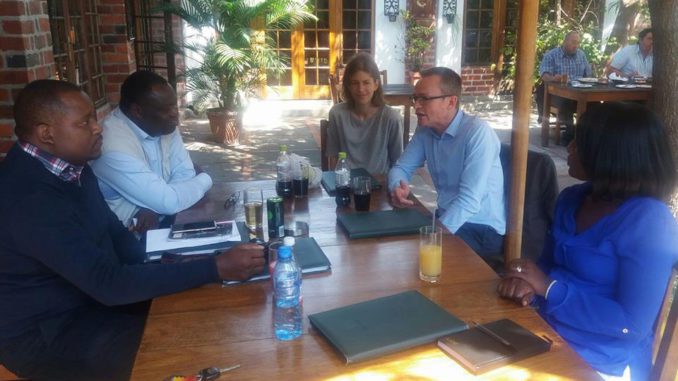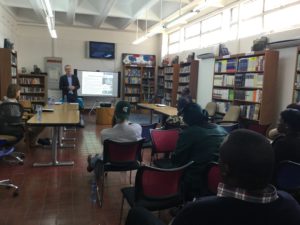
Miles Larmer is PI, ‘Comparing the Copperbelt’ project in Oxford.
The ‘Comparing the Copperbelt’ project has been designed to enable the greatest possible interaction with both research communities in Zambia and the DR Congo and – more indirectly – the contemporary mine communities that are, historically, the subject of the project’s analysis. Our activities have been designed to ensure that, during the research period, we learn from and build on African research expertise, and feed our research findings back to academics, civil society and mine communities themselves.
Engaging in such activities is however not straightforward, and certainly involves awareness of the ways in which earlier generations of western academic researchers in these communities – who are themselves the subject of our research – shaped external understanding of these mining areas but failed to appreciate the extent to which their findings both affected, and were affected by, the communities they studied and constructed. Such research may be likened to ‘enclave’ mining initiatives, in which mine companies strip mineral resources from Africa in ways that offshore the benefits whilst providing little or no benefit to the workforces, communities and countries in which they operate. Intellectual activities run the same risk of moral hazard, producing knowledge strictly for the benefit of (largely western) university researchers. It is clear for example that the researchers of the Rhodes-Livingstone Institute, or its Belgian equivalents, gave little or no thought to how their work might be received or perceived by the communities they studied, and the same is true of many of their post-colonial successors.
It would thus be ironic if our own research project, which itself analyses how Copperbelt communities have themselves shaped the ideas of (largely western) researchers over the past sixty years, replicated the tendency of many of our predecessors to such extractive knowledge production. From the start, the Copperbelt project has sought to engage with the Zambian and Congolese academics and researchers, to learn from them and to share our project findings as they develop. This is enabled partly through the Copperbelt Research Network, established as a result of the project; by this blog series, which enables the dissemination of research activities and ideas by a range of researchers; and by the ERC’s funding of Open Access publications, which enables all research outputs to be immediately and publicly available. Technological change also means that, unlike previous subjects of studies, today’s Copperbelt residents can respond to and proactively engage with academic researchers – by email and social media – in a way unthinkable until recently.
On the other hand, it is vital for academic researchers to recognise their marginality in relation to the communities about which they generally write, and the continuing inequalities and distances that contribute to this marginality. In our case, the hegemony of European languages among intellectual elites in Africa and globally means that populations for whom the main language is Swahili, Bemba or Lunda, will be unable to access research often constructed in foreign and often jargonistic academic French or English. Electronic communication of research findings remains accessible only to a small minority of Copperbelt residents and there is as a result often a comprehension gap between researched and researcher which impoverishes the quality of the engagement and of the research itself.
As one aspect of our attempts to overcome such challenges, during a major research visit to Zambia in July-August 2017 researchers from the Copperbelt project met with colleagues from both the University of Zambia and Copperbelt University, and gave talks about the project. The aim was to share our mutual research interests and agendas and to ensure that Zambian academics have the opportunity to engage as closely as possible with our work.
The first talk took place at the Southern African Institute for Policy and Research (SAIPAR), a leading regional research institution based in Lusaka. We discussed the project as a whole and received positive feedback, much of it related to recognition that the Copperbelt is seen as a region at the heart of the country’s economic and political development. In recent years, as Copperbelt residents have migrated to other parts of Zambia particularly Lusaka, they have brought new political ideas and practices to the capital which are at the heart of contemporary politics.
 In Kitwe, on the Copperbelt itself, we gave a presentation at the Copperbelt University (CBU) kindly hosted by Prof Owen Sichone, a leading figure in Zambian political and social studies, at the university’s Dag Hammarskjöld Institute – named after the former UN Secretary General who was killed in a mysterious plane crash on the Copperbelt while negotiating an end to the Katangese secession in 1961. Audience participants raised a wealth of interesting and important topics, including the wider history of cross-border exchange and engagement by Zambian and Congolese residents over past century, the more recent migration of Copperbelt workers to the new copper mines being opened in the country’s North-West Province, and the likely political consequences of these movements.
In Kitwe, on the Copperbelt itself, we gave a presentation at the Copperbelt University (CBU) kindly hosted by Prof Owen Sichone, a leading figure in Zambian political and social studies, at the university’s Dag Hammarskjöld Institute – named after the former UN Secretary General who was killed in a mysterious plane crash on the Copperbelt while negotiating an end to the Katangese secession in 1961. Audience participants raised a wealth of interesting and important topics, including the wider history of cross-border exchange and engagement by Zambian and Congolese residents over past century, the more recent migration of Copperbelt workers to the new copper mines being opened in the country’s North-West Province, and the likely political consequences of these movements.
The CBU talk was attended by academics but also representatives of non-academic institutions, including the Mineworkers’ Union of Zambia (MUZ). During our time in Kitwe, we held further meetings with MUZ representatives and with campaigners working on the environmental effects of copper and cobalt mining. Although our project is historical in nature, there is a great desire among contemporary civil society organisations and campaigners to learn about the history of the region’s experience of labour relations and environmental impact – and how this played out differently on both sides of the Copperbelt border. John Lungu, a leading expert on mining development and one of our project advisory group, also met with us to discuss the project and its future development.
Over the next three years we will hold larger-scale workshop and conference events in Zambia (July 2018), the DR Congo (July 2019) and in Oxford (March/April 2020), which will involve a wide range of researchers from the region to engage with our project. A particular aim of these events will be to bring together experts from the two countries who because of limited funding have few opportunities to meet with each other. We are confident that such critical engagement will benefit our own research and we greatly hope that they are of equal benefit to the research communities in the countries with which we are working.
We however recognise that we must find creative ways both of disseminating our research findings and engaging with the concerns of those we study and we ask you our blog readership to suggest ways we may do this better and/or differently: please email miles.larmer@history.ox.ac.uk or join the Copperbelt Research Network to share your ideas.
